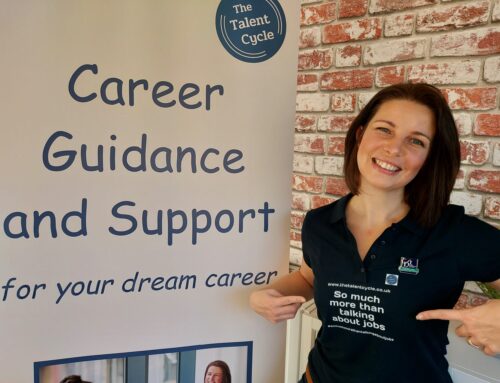Students at school will need to recognise and cope with stress in order to get through their exams, look for a job, or whilst applying for further study. In the future they will need to manage a challenging day at work, create a good work/life balance and manage family commitments. Coping strategies provide a supportive mindset and that’s a really important skill for students to learn.
This article talks about teaching students to use coping strategies. This is to help them recover from setbacks, unforeseen events, or obstacles.

Instances where your students might feel stressed and need coping strategies:
- Choosing their options post 16.
- Choosing whether to go to work or go onto further study.
- Managing society changes (e.g. the Covid-19 pandemic).
- Applying for a job/an apprenticeship/further study.
- Completing coursework/exams.
- Rejection from a job or a course.
Coping strategies create balance. They’ll also give students a sense of confidence and achievement when they are able to manage setbacks effectively. Finally, they support students’ mental health, so they are not physically or emotionally drained by changes.
Why do employers care about wellbeing and avoiding stress/burnout?
Having coping strategies will help our students in the future when they become employed.
Businesses want to remain competitive and attracting the best talent will help them do well. They do this by being agile, flexible, and moving with the trends of the day. Projects can stop or start based on meeting clients’ requirements or services. A quote by Heraclitus of Ephesus 535 BC – 475 BC is still very relevant today: ‘The one constant in life is change… It is clinging to what is known and considered to be safe that is the downfall of life’. Changing demands mean that roles might change e.g. having more varied hours, including working from home, or having to pivot and to provide more resources online.
Some of these changes may leave employees feeling isolated and/or with increased levels of stress. Others will feel fairly happy with the work set up. However, it’s important for your students to learn the impact a working arrangement might have on them and to notice the signs of stress. This can be about getting them to acknowledge how they feel and to realise when they may need some extra help. There may be support available to them at their workplace, or if they go on to study, at their college. Students and employees with a higher level of resilience are likely to have increased problem-solving skills, adaptability and emotional intelligence. These skills are very attractive to employers.
Coping strategies
The four coping strategies below can be taught to students and will build on their self-awareness:
- Building emotional intelligence
Building emotional intelligence includes understanding yourself, so that you can understand others better. It gives you the ability to manage your own emotions and supports your ability to work well with others in a team.
Emotional intelligence is a collection of four key areas:
Self-management – where you’re able to control impulsive feelings and behaviours, and manage your emotions in healthy ways. You’re also able to take the initiative, follow through on commitments and adapt to changing circumstances.
Self-awareness – this is where you recognise how your emotions affect your thoughts and behaviour. You know your strengths and weaknesses and have self-confidence.
Social-awareness – where you develop empathy and can understand the emotions, needs and concerns of others. You can also pick up on emotional cues and recognise the power dynamics in a group.
Relationship management – you know how to develop good relationships, communicate clearly, as well as being able to inspire and influence others.
- Knowing about limiting beliefs
A limited belief is something you believe to be true that limits you in some way. Your own limiting beliefs can impact on your ability to bounce back from adversity. Sometimes our internal dialogue isn’t accurate and is based on feelings and emotions, which change all the time. For example, you may feel nervous and have the limiting belief that you don’t do well at job interviews, due to the fact you had a challenging one previously. Therefore, you limit your ability to move forward.
You can seek to change limiting beliefs. You can do this by trying to be positive and flexible in your thinking, to have perspective and avoid using your feelings as your primary source of information.
- Learning that it is OK to fail
Learning that it’s OK to fail is about seeing the bigger picture and how, by making mistakes, you can actually improve your skills. For example, if you fail an exam, next time you can give yourself more time to study, or you can make sure that you look at enough practice tests. Make sure you’re taking practical steps to support yourself, such as getting advice if there’s help available (for example, by talking to teachers).
Carol Dwek[1], when talking about having a growth mindset, says that you learn by taking criticism on board, as well as from effort and persistence. Coping strategies are about learning from mistakes, building up emotional intelligence, embracing failure as part of the journey to professional development and self-reflection.
- Looking after your physical and mental health
Looking after your own wellbeing is essential in today’s busy world. This consists of getting enough sleep, exercise and eating healthily.
‘Self-care’ is a word that has come into fashion over the past few years. This involves being kind to yourself and not beating yourself up if something you do doesn’t work out perfectly. Included here is knowing when to have a rest from working or studying. Often simply going for a walk outside for a change of scenery can help. Having a compassionate attitude towards yourself is important. This can help you to look after both your mental and physical health.
Exercise – which coping strategies can you use?
The following scenarios can be given to students as an exercise in class, to help them understand how they can deal with adversity.
Scenario 1:
You are applying for jobs and you have knockbacks, either as outright rejections, or when the company doesn’t respond to your application.
What coping strategies can you use? For example, can you take time to review what you can change in order to submit a better application, or are you applying for roles for which you’re not the best match? Any other coping mechanisms could you tap into?
Scenario 2:
You’ve got deadlines on several essays for school. They all have to be in for the same date. Which statement most closely relates to how you would typically react:
A: I’d complete the easiest ones first and think about the others later. I often don’t get the grades I want, which is upsetting.
B: I’d start them all at the same time, as I might be able to use similar resources and references if the content crosses over. However, I’m often rushing to get all completed on time.
C: I’d start with the most challenging first, as that one would take up more time. Then I’d tackle the easier ones. It’s hard to keep motivated though.
Learning points: A – this is a reasonable choice in terms of managing easy tasks first but without good time management and project planning, you might not have enough time. Plus it looks like your grades are making you unhappy, this may lead to stress.
Learning points: B – it is good that you are starting all at the same time, so that each assignment has your attention, plus you are being resourceful in assessing if they could share references and content. You also note that time management is an issue. You might need to review your approach, planning and coping strategies, considering rushing might cause stress which may mean you have emotional and physical issues.
Learning points: C – This is a strategic choice in terms of planning and time management. However, you state your difficulty in staying motivated. Maybe you need to review your planning and preparation, including re-assessing your motivations, distractions and ability to stay focused on tasks. Perhaps also looking at your coping strategies as well will help, including ensuring you factor in enough balance and range of tasks to keep you interested.
Discussion: Which choice would you make? What coping strategies could you use?
Scenario 3:
Recruitment processes are taking place online and you’ve never had to have a virtual interview before.
What coping strategies can you use?
Other sources of support:
- How to manage stress (Mind.org.uk) – link to: https://www.mind.org.uk/information-support/types-of-mental-health-problems/stress/developing-resilience/
- 5 resilience tips for the frazzled (Happiful magazine) – link to: https://happiful.com/5-resilience-tips-for-the-frazzled/
[1] Dweck, C. S. (2017). Mindset – Updated Edition: Changing the way you think to fulfil your potential. New York: Robinson

Lisa is a registered careers practitioner with the CDI. She has worked as a careers consultant in the NHS and the university sector. She has also trained in Leadership Coaching and is a Certified Associate member of APECS (the Association of Professional Executive Coaches and Supervisors).





